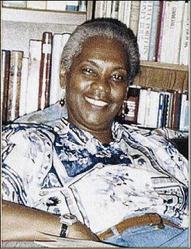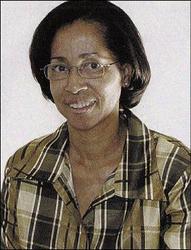Howard Campbell, Gleaner Writer


Pansy Robinson (left) and Jennifer O'Sullivan-Sirjue. Contributed
Tracing the family line
GENEALOGY MAY not be a big thing in Jamaica, but as more persons become interested in finding long-lost relatives, Jennifer O'Sullivan-Sirjue and Pansy Robinson thought the time was right to get Jamaicans interested in their roots.
Their book Researching Your Jamaican Family was released in January by Kingston's Arawak Publications. O'Sullivan-Sirjue told The Gleaner recently that Robinson and herself went for a 'how to' format, mainly to peak the interest of family historians.
"I find that the Jews, Chinese and to some extent East Indians are interested (in genealogy) but the African side are not much into it," she said.
O'Sullivan-Sirjue, a teacher by profession, says she was inspired to research her family's history several years ago while conversing with a relative from Canada at a family reunion in Hanover. Shortly after, she said she told fellow educator Robinson about her plans, and discovered she was contemplating a similar project.
Ways to find family records
What started as a 'how to' book fleshed out as the collaborators went along. In addition to pointing out ways to find family records (through birth, marriage and death certificates at the Registrar General's Department and family Bibles), they look at Jamaica's various ethnic and religious groups and how they came to the Caribbean.
Once those records are secured, O'Sullivan-Sirjue said the 'historian' is well on the way to 'planting' their family tree.
O'Sullivan-Sirjue says because records of any kind were not kept for enslaved Africans, it is difficult for persons of African descent to do a comprehensive trace of their roots. She was able to source her lineage five generations through an 1855 land document in Manchester, to an Irish grandfather who settled here in the mid-19th century.
Less pressure
Other ethnicities such as the Chinese and East Indians who first came to the Caribbean to work as indentured servants in the mid and late 19th century have less pressure.
"The Chinese have done a lot of work on genealogy, remember they have always had a benevolent society and maintained their arrival dates," O'Sullivan-Sirjue explained. "The East Indians have done less but depend a lot on oral traditions."
The comparatively smaller Jewish-Jamaican community is also strong on records. Many descendants, like Island Records founder Chris Blackwell (a member of the Lindo family) can trace their ties here to the 18th century when thousands of Jews fled Europe for the New World to escape prejudice and persecution.
O'Sullivan-Sirjue says Afro-Jamaicans who show most interest in digging up roots are usually those who immigrated.
"When they migrate they have an interest in their roots and that can be seen at family reunions. That's a useful tool to keep in touch," she said.
Researching Your Jamaican Family was released in the United States in August. It is available locally through Sangster's Book Stores Limited.
Cricket writer and former Gleaner sports editor Tony Becca says his grandfather came to St Thomas, Jamaica, from Madras, India.
The Thwaites family (which includes parliamentarian Ronald Thwaites and Jamaicans For Justice's Carolyn Gomes) are descendants of National Hero George William Gordon.
Former St Thomas councillor Constantine Bogle is a grandson of National Hero Paul Bogle.
The Chinese in Jamaica, released in 1957, is a compilation of the early Chinese settlers in Jamaica. Ray Chen's 2004 book, The Shopkeepers, looks at 150 years of the Chinese in the country.

